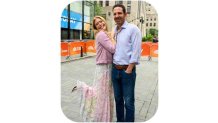June 26 at 3:30 p.m. I remember saying to myself, “My life is never going to be the same.” It was the day I was told I had breast cancer.
I had always feared this day would come, but I never really thought it would. Just three weeks before, in between work calls, I had taken an at-home saliva test by a genetic testing company and mailed it in. Honestly, I had forgotten I even did it.
My grandmother passed away from breast cancer. And my beautiful mother — who is healthy now — had a double mastectomy in her late 40s after being diagnosed with ductal carcinoma in situ, often referred to as stage 0 breast cancer. If left untreated, DCIS can turn into invasive cancer, according to the American Cancer Society.
After her surgery, she tested negative for mutations in her BRCA genes, and she is still negative. So I assumed I didn’t need to test for that, but was vigilant on keeping up with my screenings. And I had wrongly thought, like so many other friends I have since spoken to about this, that breast cancer was mostly something only women needed to monitor.
Get Tri-state area news and weather forecasts to your inbox. Sign up for NBC New York newsletters.
I was wrong. Very. If you are not familiar with this test, the BRCA1 and 2 genes, which I now know are inherited from your mother and father, are tumor suppressing genes that are important for fighting cancer. Mutations to these genes can greatly increase your risk of developing certain types of cancer, especially breast, ovarian and prostate cancer, according to the Centers for Disease Control and Prevention.

But because of my family history, my doctors at Schaffer, Schonholz & Drossman in New York, and my general practitioner, Dr. Allison Spatz, told me: “You should just get genetic testing anyway to make sure.” That suggestion saved my life. On June 20, I got a call from Dr. Susan Drossman telling me that I was BRCA2 positive. And as it turns out, my father is BRCA2 positive, too. And because of those positive tests, which I will be forever grateful we took, my father will get screened and stay vigilant about breast, prostate and pancreatic cancer, which he now knows he’s at a higher risk for.
Health
And because of that test, I had a sonogram and an MRI and it turns out...I have breast cancer.
I am telling this story now because I couldn’t go through months of operations, and start to recover both physically and mentally, without shouting from the rooftops telling everyone to check with their doctors to see if genetic testing is appropriate. By the time I recover from my first surgery, I hope that many of you will know your results and can make proactive decisions with your doctors, families and loved ones. That is the silver lining to this mess for me. It is what is keeping me going and giving me strength.
It all happened so fast. It is hard to believe just one month ago I was in Paris celebrating my mother’s 75th birthday. But I have had some time to process, so now I’m in get-it-done robotic mode. Different people cope in different ways; for me, I am not hiding under the covers crying. Instead, I want to do everything I can to beat this and protect my family.
Let me be clear: I am heartbroken for so many reasons, but mostly watching my parents watch me go through this. But I trust my father with every morsel of my being, and he told me, “We got this, and we will fight this together.” I am devastated and empowered, all at the same time.

My first surgery is this week. I will be having a double mastectomy with Dr. Elisa Port, chief of breast surgery for the Mount Sinai Health System, and I’ll begin reconstruction with Dr. Mark Sultan, a specialist with Mount Sinai. My treatment plan will also be informed by the results from my surgery. My OB-GYN, Dr. Karen Brodman, has advised that, in a few months, I will also need my ovaries and fallopian tubes taken out as part of the preventative surgery process, as my chances of getting ovarian cancer are now 20% higher, according to my doctors. That is not a percentage I am willing to live with.
I am talking about this not to scare you, but to raise awareness so that maybe you can be tested and identify a BRCA or other genetic mutation earlier. If I had known I was BRCA positive, I would have gotten screened more regularly, with an MRI alternating with my mammograms. What I didn’t know before this experience was that an MRI can pick up cancers that mammograms miss. So while my mammograms missed the presence of breast cancer, an MRI might have helped me catch it earlier. Earlier testing also might have led me to the opportunity to have preventative surgery — which is something I had planned to do only days before I found out that I actually had cancer.
If you are a woman who’s tested positive for a mutation to the BRCA1 or 2 genes, you have a greater than 50% chance of getting breast cancer by the time you turn 70, according to the Centers for Disease Control and Prevention. If you are a man who’s tested positive for the BRCA2 mutation, as my father is, you have a 7 to 8% chance of developing breast cancer, according to a 2007 study in the Journal of the National Cancer Institute. These are not numbers to ignore. Plus, having a BRCA mutation can increase your risk of numerous other cancers, such as ovarian cancer, prostate cancer and pancreatic cancer, according to the National Cancer Institute.
Of the friends and family I’ve shared the news with so far, many have asked: “What can I do for you?”
I am strong, and I will fight this. But there is one thing you can do for me:
Get Informed
- Women and men: Talk to your doctor about whether genetic testing for your risk of cancer is right for you. And if your mother or father tested more than 10 years ago, they may need to retest. There are many companies that perform validated genetic testing. Dr. Port actually developed a program at Mount Sinai that provides genetic testing for both BRCA genes and helps the public access and understand cancer screening guidelines if you do test positive, regardless of your age. You can learn more here. Of course, it’s up to you to decide your course of action with your family and doctors, but at least you will be informed, and whatever decision you make will be your choice.
- Understand that breast cancer can go undetected by a mammogram. Mammograms miss 1 in 8 breast cancers, according to the American Cancer Society. Even today, with a known cancer, my cancer is undetectable on a mammogram — but it was seen on both a sonogram and an MRI. If you have a BRCA mutation, recommended guidelines are to start screening for breast cancer with an MRI starting at age 25, and mammograms are added at age 30, according to the American College of Obstetricians and Gynecologists. To put things into perspective, I had my last mammogram in January, which read as normal. And my cancer still, to this day, does not show up on a mammogram. I know. It is so beyond scary. But to be clear: Mammograms are indeed the best way of screening for breast cancer. But they are not perfect; no test is. So that’s why doctors add MRI and/or sonograms for screening in high-risk patients, such as those with BRCA mutations or dense breasts.
- Know the effect on your children. If you are BRCA positive and have children, each child has a 50% chance of getting the gene passed down to him or her. Doctors can help you decide the age that is best for a child to test or know when to begin a BRCA screening program. This is not a one-size-fits-all answer.
I hope that by starting this conversation, we can make a difference together. According to a 2016 study that Dr. Port told me about, there’s now a term known as the Angelina Jolie Effect. When Jolie announced she was getting preventative surgery in 2013 after losing her mother to breast and ovarian cancer and testing positive for the BRCA gene, the number of people who went and got tested in the next six months increased by 105%, according to the study. In addition, the number of people discovered to actually have the gene mutation among those who got tested also doubled. Do you know how many lives she likely helped save? My guess is a lot.

Honestly, I am doing OK. I have a loving husband, amazing family and friends and an incredible support system. I have my head on straight and know exactly what needs to be done. Am I scared? Of course. Who wouldn’t be? But I know cancer has nothing on me. We lost my incredible grandmother to this disease because the science wasn’t there. But it is now, and I will know she is with me all the way.
I’ll leave you with a laugh, as that is how my family copes. This is what the great Al Roker said to me when I told him what was happening: “Nothing steals your joy, and you will deal with it as only you can. We love you.”
I have been at the show for 15 years and have shared the happy, the exciting, the sad and now, the scary. Cancer messed with the wrong family — both my immediate family and, you, my TODAY family. We will crush this together.
This story first appeared on TODAY.com. More from TODAY



